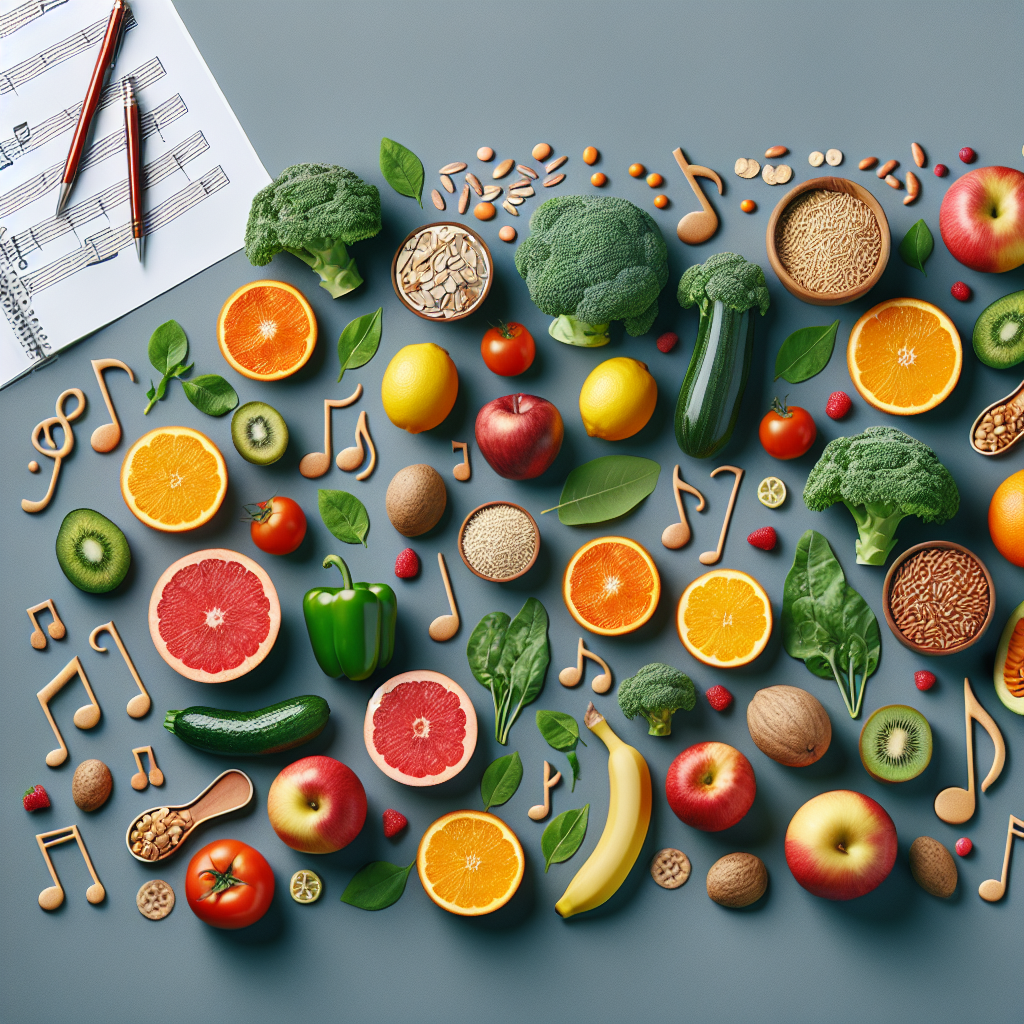Vitamins That Support Musicians’ Health

Boost your performance and maintain your health with vitamins specifically designed for musicians. Don’t let fatigue or stress hinder your passion. Click here to explore our range of vitamins that support musicians’ health.
Essential Vitamins for Musicians: Boosting Performance and Health
Musicians, like athletes, require a unique set of nutrients to support their physical and mental performance. The rigors of practice, performance, and touring can take a toll on their health, making it essential for them to maintain a balanced diet rich in essential vitamins. These vitamins not only boost their performance but also support their overall health.
Vitamin B complex, for instance, plays a crucial role in a musician’s health. This group of vitamins, which includes B1 (thiamine), B2 (riboflavin), B3 (niacin), B5 (pantothenic acid), B6 (pyridoxine), B7 (biotin), B9 (folate), and B12 (cobalamin), is essential for converting food into energy. This energy is vital for musicians who often have long, physically demanding performances. Moreover, B vitamins are also known to support brain function, helping musicians maintain focus and mental clarity during their performances.
Another essential vitamin for musicians is Vitamin C. This vitamin is a powerful antioxidant that helps protect the body against the harmful effects of free radicals, which can cause cell damage. For musicians, this is particularly important as they are often exposed to high levels of stress, which can increase the production of free radicals in the body. Additionally, Vitamin C supports the immune system, helping musicians stay healthy and resilient, especially during touring seasons when they are more susceptible to illnesses.
Vitamin D is also crucial for musicians. It is known for its role in bone health, which is particularly important for musicians who play instruments that require physical exertion, such as drummers or guitarists. These musicians can put a lot of strain on their bones and joints, making it essential for them to have strong, healthy bones. Moreover, Vitamin D also supports mental health, helping to regulate mood and ward off depression, which can be beneficial for musicians who often face high levels of stress and pressure.
Lastly, Vitamin E is another essential vitamin for musicians. It is a powerful antioxidant that helps protect cells from damage. This is particularly important for musicians who often expose their bodies to high levels of physical stress. Moreover, Vitamin E also supports heart health, which is crucial for musicians who need to maintain a strong cardiovascular system to support their physically demanding performances.
In conclusion, vitamins play a crucial role in supporting a musician’s health and performance. They not only provide the energy needed for physically demanding performances but also support brain function, immune health, bone health, and heart health. Therefore, it is essential for musicians to maintain a balanced diet rich in these vitamins or consider taking supplements if necessary. However, it is always recommended to consult with a healthcare professional before starting any new supplement regimen. By prioritizing their health, musicians can ensure that they are always at their best, both on and off the stage.
The Role of Vitamins in Enhancing Musicians’ Stamina and Focus

Musicians, like athletes, require a unique blend of physical stamina, mental acuity, and emotional resilience to perform at their best. The demands of long rehearsals, late-night performances, and the emotional toll of creative expression can take a significant toll on a musician’s health. Therefore, maintaining optimal health is crucial for musicians, and vitamins play a pivotal role in this regard.
Vitamins are essential nutrients that our bodies need in small amounts to function correctly. They are involved in numerous biological processes, including energy production, immune function, and brain health. For musicians, certain vitamins can help enhance stamina and focus, two critical aspects of a successful performance.
Firstly, let’s consider the role of B-vitamins. The B-vitamin complex, which includes vitamins B1, B2, B3, B5, B6, B7, B9, and B12, plays a crucial role in energy production. These vitamins help convert the food we eat into glucose, which is used for energy. They also assist in the formation of red blood cells, which transport oxygen to the muscles. This is particularly important for musicians, who often need to maintain physical activity for extended periods. A deficiency in B-vitamins can lead to fatigue and reduced stamina, hindering a musician’s ability to perform.
Moreover, vitamin B6 is essential for the production of neurotransmitters, chemicals that transmit signals in the brain. This can help improve focus and concentration, enabling musicians to maintain their attention during long performances or recording sessions. Similarly, vitamin B9, also known as folate, is involved in brain function and mental and emotional health. It can help manage stress levels, which is particularly beneficial for musicians who often face high-pressure situations.
Next, we have vitamin D, often referred to as the “sunshine vitamin.” Research has shown that vitamin D can help improve mood and reduce symptoms of depression. This is particularly important for musicians, as the emotional demands of their work can sometimes lead to mental health issues. Additionally, vitamin D plays a role in maintaining bone health, which can be beneficial for musicians who play instruments that require physical exertion.
Lastly, let’s not forget about vitamin C. This vitamin is well-known for its role in supporting the immune system, which can help musicians stay healthy despite their often hectic and irregular schedules. Moreover, vitamin C is involved in the production of collagen, a protein that helps maintain the health of the skin, hair, and nails. This can be particularly beneficial for musicians who are often in the public eye.
In conclusion, vitamins play a crucial role in supporting musicians’ health by enhancing stamina and focus. B-vitamins are essential for energy production and brain function, vitamin D can help improve mood and maintain bone health, and vitamin C supports the immune system and contributes to physical appearance. However, it’s important to remember that vitamins should be part of a balanced diet and healthy lifestyle, rather than a substitute for one. Musicians, like everyone else, should aim to get their vitamins from a variety of foods, and consider supplements only if recommended by a healthcare professional.
Top Vitamins That Promote Vocal Health and Endurance for Musicians
Musicians, particularly vocalists, rely heavily on their physical health and endurance to deliver stellar performances. One of the key aspects of maintaining optimal health is ensuring a balanced intake of essential vitamins. These vitamins not only support overall health but also play a significant role in promoting vocal health and endurance.
Vitamin A is one of the most crucial vitamins for musicians. It is known for its role in maintaining the health of the mucous membranes, which line the throat and nasal passages. These membranes are the first line of defense against infections that can affect vocal health. Vitamin A also supports the health of the skin, including the delicate tissues of the vocal cords. Foods rich in Vitamin A include carrots, sweet potatoes, and spinach.
Next in line is Vitamin C, often hailed as a wonder vitamin due to its numerous health benefits. It is a powerful antioxidant that helps protect the body, including the vocal cords, from damage caused by free radicals. Vitamin C also boosts the immune system, helping to ward off infections that can lead to throat issues. Citrus fruits, strawberries, bell peppers, and broccoli are excellent sources of this essential vitamin.
Vitamin E is another antioxidant that is beneficial for vocal health. It helps protect the cells of the body, including those in the throat, from damage. Vitamin E also supports immune function, further safeguarding the vocal cords from infections. Foods like nuts, seeds, and spinach are rich in Vitamin E.
B vitamins, particularly B6 and B12, are also essential for musicians. These vitamins support nerve function, which is crucial for controlling the vocal cords. They also help in the production of red blood cells, which carry oxygen to the tissues of the body, including the vocal cords. This ensures that the vocal cords function optimally during performances. Foods like fish, poultry, meat, eggs, and dairy products are good sources of B vitamins.
Vitamin D is another important vitamin for musicians. It supports bone health, including the small bones in the throat that are involved in voice production. Vitamin D also plays a role in muscle function, which is important for the control of the vocal cords. The body can produce Vitamin D when exposed to sunlight, but it can also be obtained from foods like fatty fish and fortified dairy products.
Lastly, we have Zinc, which, while not a vitamin, is an essential mineral that supports vocal health. Zinc is known for its role in immune function, helping to protect the throat from infections. It also supports cell growth and repair, which is important for the health of the vocal cords. Foods like oysters, beef, and pumpkin seeds are rich in Zinc.
In conclusion, a balanced intake of vitamins A, C, E, B6, B12, D, and the mineral Zinc, can significantly support vocal health and endurance in musicians. However, it is important to remember that while these vitamins and minerals are beneficial, they should be part of a balanced diet and not a substitute for professional medical advice or treatment. Musicians who are concerned about their vocal health should consult with a healthcare professional to ensure they are getting the right nutrients for their specific needs.